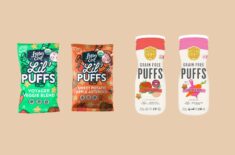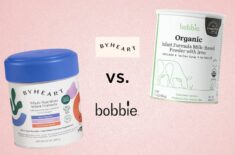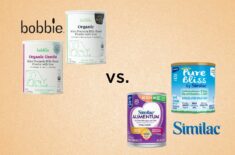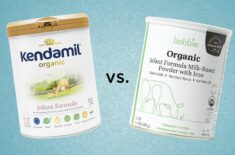Overview
Would an apple a day really keep the doctor away? That question hasn’t been clinically proven, but many studies have shown that apples can reduce the risks of certain cancers, diabetes, asthma, and heart disease. (1)(2)(3)
You might be asking questions such as:
“Can we give raw apple to a seven-month-old baby?”
“Can my baby choke on apples?”
“How do you soften apples for baby-led weaning?”
We’ve prepared this guide for introducing apples following the baby-led weaning method just for you, mama. You can find our answers to these common BLW questions below, plus an easy apple recipe to try.
What’s BLW?
BLW or baby-led weaning is a feeding approach that lets your little one eat independently, with healthy food choices they can pick up with their hands. It’s complementary to breastfeeding or formula. (4)
Your baby eats finger foods in BLW, but you can also opt to give them purée they can self-feed using their fingers or a spoon.
Because they’re the ones to pick up the food and feed themselves, your baby needs to be ready for BLW. It’s also for their safety.
You can learn how to check for signs of your baby’s readiness and other important aspects of this feeding approach in our BLW guide.
Benefits of Apples In BLW
Nutrition Facts
Apples contain nutrients important for your baby’s health, including the following: (1)
- Vitamin C
- Phytochemicals (plant chemicals like quercetin, catechin, and anthocyanin are believed to protect cells from damage that can lead to cancer) (5)
- Fiber, soluble and insoluble
- Vitamin B6
They Can Help Improve Heart Health
Apples are rich in fibers, vitamin C, and dietary polyphenols, antioxidants that can help fight harmful free radicals in the body. These can lower cholesterol and help improve heart health. (1)(6)(7)
They Can Help Prevent Cancer
Studies show that the phytochemicals in apples can help prevent cancer and inhibit tumor cell growth. (2)(3)
They Can Help Manage Asthma
Apples can help prevent and manage asthma, which can cause breathing problems from swollen, narrowed airways and extra mucus production. (2)
They Can Help Prevent And Manage Diabetes
Those who regularly eat apples might have a 28% reduced risk of developing type 2 diabetes (high blood sugar levels). (8)
It can also help protect the pancreas from damage. This organ is responsible for secreting insulin when there’s extra sugar in the blood, but it has to work harder in diabetic people. (1)
They Can Support The Immune System
Vitamin C and other nutrients in apples can also help boost the immune system, helping prevent or manage inflammation. (1)(9)(10)
Food Safety With Apples
Are Apples A Choking Hazard?
Yes, raw apples are one of the common choking hazards for babies and children. (11)
Studies show that apples are among the most common foods that cause choking among children below two years old. (12)(13)
The good news, mama, is that you can make apples become a safer food for your baby by cooking them until they’re soft and cutting them into slices appropriate to their age. We’ll discuss that below.
Are Apples An Allergen?
Apples aren’t considered a common allergen; however, some rare cases have been reported. (14)(15)
Apple allergies might be closely related to pollinosis (hay fever) or oral allergy syndrome instead of being a “true allergy.” (14)(15)
Oral allergy syndrome is so-called because its symptoms are more commonly experienced in and around the mouth. These can include: (16)
- Itchy mouth
- Scratchy throat
- Swelling of the mouth, lips, tongue, and/or throat
- Itchy ears or hives on the mouth
The proteins that cause the allergic reaction can break down easily, with heat and stomach acids. So, the symptoms can quickly subside. (16)
Cooking can distort these proteins, making them unrecognizable to the immune system. So, they might no longer trigger an allergic reaction.
Although severe reactions can be rare, it’s best to watch your baby for signs of breathing difficulties if it’s their first time to eat apples. Seek immediate treatment.
You can introduce apples in small quantities if possible, then gradually increase them if your child doesn’t show adverse reactions.
Other Safety Concerns With Apples
Apples regularly make it to the top of the “Dirty Dozen,” the EWG (Environmental Working Group) list for foods with the highest amounts of pesticide residues. (17)(18)
According to the EWG, conventionally grown apples are sprayed with an antioxidant chemical called diphenylamine. It prevents apples from developing brown or black patches, but there’s growing concern that it can cause cancer. (18)(19)
Still, the EWG notes that apples are a nutritious food. So, they recommend organic ones as the best apples to pick because they’re certified to be free from pesticides and other harmful chemicals. (18)
You can still choose conventionally grown apples, but make sure to soak in baking soda solution (1 tsp baking soda per two cups of cold water) for 15 minutes. It helps remove surface pesticide residues. (20)
But it’s better to remove the peel of conventionally grown apples.
Can I Give Apple Jam To My Baby?
No. Most apple jams contain plenty of added sugar, which can increase the risks of obesity. It might be best to wait until your child is at least two years old before giving them foods with added sugars. (21)
Can Babies Drink Apple Juice Or Cider?
No. It’s best to avoid giving apple juice or apple cider to children below 12 months old unless directed by your pediatrician. These drinks can have plenty of added sugar, which can be unhealthy for your baby. (22)
Can Babies Have Apples in BLW?
Yes. Apples are considered a healthy food option in baby-led weaning once your child is ready for solid foods.
However, because they’re a common choking hazard, it’s important to ensure you cook them until soft and cut them into appropriate sizes before giving them to your baby.
How Do I Give My Six-Month-Old Apples?
Always cook apples until tender before giving them to your 6-month-old baby.
You can peel the apple and half it or cut it into quarters that your baby can hold without accidentally swallowing the whole piece.
Some ways to serve apples in BLW:
- Steamed apple slices
- Homemade applesauce or apple purée (your baby can self-feed using their fingers or use it as a dip)
- Mashed apples with sweet potatoes
- Chicken, apples, and veggies
Can We Give Raw Apple To A Seven-Month-Old Baby?
Don’t give babies this age raw apples.
Instead, cut peeled apples into thick slices and cook until tender before giving them to your baby.
Can An Eight-Month-Old Baby Eat Raw Apple?
No. Raw apples are a choking hazard. You can wait until they’re at least one year old before offering them to your child.
It can be better to cook them until tender and dice them into bite-sized pieces they can pick up with their thumbs and index fingers (pincer grasp) at this age.
Preparing Apples For BLW
Types of Apple
There are many different types of apples, including the following:
- Granny Smith
- Pink Lady
- Fuji
- Golden Delicious
- Cosmic Crisp
How Do You Soften Apples For Baby-Led Weaning?
- Steaming
- Roasting
- Baking
- Blending to make baby puree
How To Stop Cut Apples From Turning Brown
You can soak the apple pieces or slices in pineapple or lemon juice.
How Do You Cut Apples For Baby-Led Weaning?
For 4-9 Months:
- Don’t give babies raw apples as first foods. Instead, cut peeled apples into thick slices.
- Cook until tender.
For 9-12 Months:
- You can offer cooked apples in small pieces or thinner slices.
For One Year And Above
- You can continue giving cooked apples or offering raw apples to this age group. But be sure to monitor them during mealtime so they won’t bite off a large chunk, which can be a choking hazard.
Baby Food Recipe: Sautéed Apples Wedges
Prep time: 5 minutes
Cooking time: 10-15 minutes
Ingredients
- One or two medium apples (peeled, cored, and cut into wedges)
- 1 tsp coconut oil
- ¼ tsp cinnamon
- 2 tbsp water
Preparation Instructions
- Heat oil into a pan (medium heat)
- Add apples and cinnamon. Stir.
- Add water. Stir again.
- Turn heat down to medium-low.
- Sauté for around 8-10 minutes or until the apples are soft.
- Cool before serving.
Some parents might choose to keep the peelings on, but you can also peel them, especially for conventionally grown fresh apples.
You can also add some toppings, but you might want to avoid peanut butter because it can be allergenic and a choking hazard (thick, chunky ones).
Store leftovers in airtight containers and put them in the fridge. They can last for 2-3 days in the fridge but always check for signs of mold or spoilage before reheating and offering to your baby.
REFERENCES
(1) https://www.hsph.harvard.edu/nutritionsource/food-features/apples/
(2) https://pubmed.ncbi.nlm.nih.gov/15140261/
(3) https://pubmed.ncbi.nlm.nih.gov/18855307/
(4) http://www.rapleyweaning.com/assets/Breastmilk_vs_solids.pdf
(5) https://www.breastcancer.org/tips/nutrition/reduce_risk/foods/phytochem
(6) https://www.ncbi.nlm.nih.gov/pmc/articles/PMC5490577/
(7) https://pubmed.ncbi.nlm.nih.gov/17379619/
(8) https://pubmed.ncbi.nlm.nih.gov/16192263/
(9) https://www.ncbi.nlm.nih.gov/pmc/articles/PMC7325984/
(10) https://www.ncbi.nlm.nih.gov/pmc/articles/PMC3183591/
(11) https://www.cdc.gov/nutrition/infantandtoddlernutrition/foods-and-drinks/choking-hazards.html
(12) https://www.ncbi.nlm.nih.gov/pmc/articles/PMC5934812/
(13) https://www.ncbi.nlm.nih.gov/pmc/articles/PMC5438437/
(14) https://www.ncbi.nlm.nih.gov/pmc/articles/PMC8171779/
(15) https://www.ncbi.nlm.nih.gov/pmc/articles/PMC5334782/
(16) https://acaai.org/allergies/allergic-conditions/food/pollen-food-allergy-syndrome/
(17) https://www.ewg.org/foodnews/dirty-dozen.php
(18) https://www.ewg.org/foodnews/apples.php
(19) https://www.ncbi.nlm.nih.gov/pmc/articles/PMC7009485/
(20) https://pubmed.ncbi.nlm.nih.gov/29067814/
(21) https://www.ncbi.nlm.nih.gov/pmc/articles/PMC6959843/
(22) https://www.healthychildren.org/English/healthy-living/nutrition/Pages/Where-We-Stand-Fruit-Juice.aspx












